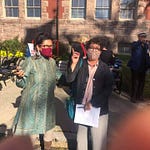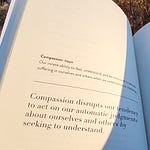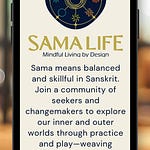May marks Mental Health Awareness Month. What does mental wellbeing look like in everyday life? How can we promote wellbeing in the middle of political unrest, workplace politics, and challenges that are part of being human?
I was meditating regularly. I had read all the books. I "knew" mindfulness was important. Yet when I found myself in challenging situations—difficult conversations, important decisions, moments of conflict—my mindfulness practice seemed to vanish precisely when I needed it most.
Maybe you've experienced this disconnect too?
In my video, I share the realization that transformed my own practice: meditation and non-judging awareness alone aren't enough to be mindful in the real world. We need a systematic framework to bring mindfulness into those crucial moments when life gets messy.
Picture this scenario: Your team is discussing a major project deadline. A newer colleague suggests completely restructuring your approach. Your initial thought? "That's impossible. She doesn't understand how things work here."
Thanks to meditation, you might not immediately dismiss her idea. You take a breath instead of reacting. But let's be honest—you're just waiting for her to finish so you can explain all the reasons why it won't work.
This is where most of us stop—less reactive, but still trapped by our assumptions and attachments to familiar ways. We're a little calmer but not much changes in how we experience the world and make decisions. Our awareness is accompanied with judgments that get in the way of seeing clearly. Our confirmation bias quietly filters out information that doesn't fit our existing views. In the absence of understanding the causes and conditions for our challenges, we can't address the root causes of our stress.
That's why I developed my 8-week immersive online class "From Overwhelm to Clarity: Mindfulness Skills for Breaking Free and Showing Up Fully." Just like we exercise for physical health, we can train our minds across eight essential mindfulness skills: awareness, compassion, curiosity, energy, appreciative joy, inner calm, focus, and equanimity.
What makes this approach unique is that it goes beyond basic mindfulness in three ways:
It develops eight essential skills that disrupt our default habits and biases
It offers a simple but powerful process: return to your present moment experience, listen within to deepen understanding, and begin your actions with the right combination of mindfulness skills
It includes micro practices and practical ways to return to mindfulness throughout your day
These skills help us disrupt those default habits keeping us stuck in unhealthy patterns that lead to stress and anxiety. Instead of suppressing emotions or acting impulsively when triggered, we learn to return to our present moment experience, listen within to our needs and intentions, and act in integrity with our values and goals.
Let's see how this works in real life. Going back to our meeting example:
Instead of getting stuck in "I'm right and she's wrong" thinking, we can use mindfulness skills to respond differently. First, we notice our initial reaction ("That won't work"). Then, instead of waiting to explain why the idea won't work, we pause and check in with what we're feeling—perhaps frustration or worry about timeline changes.
We recognize that our attachment to the current approach is causing stress, not the new idea itself. By staying focused on what really matters—the success of the project, not being right—we can genuinely listen for valuable insights in our colleague's suggestion. We might ask ourselves: "Am I resisting this because it's truly problematic, or because it's unfamiliar and challenges my authority?" This simple shift helps us ask better questions and find creative solutions together.
The table below shows how each mindfulness skill helps disrupt a specific mental habit that typically keeps us stuck. When we practice these skills regularly, they become available exactly when we need them most—in those challenging moments of daily life.
TABLE: EIGHT MINDFULNESS SKILLS DISRUPTING DEFAULT HABITS

From managing workplace tensions to navigating personal relationships, these practical skills help us respond rather than react, see more clearly, and make choices aligned with our deeper values. This Mental Health Awareness Month, I invite you to move beyond stress management to genuine transformation—bringing mindfulness into those moments when you need it most. Because true mental wellbeing isn't just about what we know—it's about how we live.
I'd love to help you develop these eight essential skills in my upcoming 8-week immersive class. Together, we'll explore practical ways to break free from default patterns and respond skillfully to life's challenges.
You can read more on my website about the eight-week program and the outline for each week. You can take the free assessment to see where you stand on the eight mindfulness skills. Which mindfulness skills do you naturally rely on and which ones might need strengthening?













Share this post